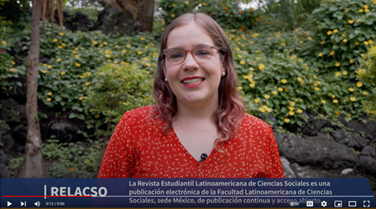(In)seguridad ontológica y confianza social en América Latina: una aproximación con modelos de ecuaciones estructurales
DOI:
https://doi.org/10.18504/rl1609-003-2020Keywords:
ontological [in]security, social trust, Latin America, factorial analysis, LatinobarometroAbstract
Latin America is frequently associated with realities of inequality, exclusion, insecurity and disenchantment. This landscape is auspicious for investigate feelings of ontological [in]security, understood as attrition to the sense of biographical continuity, founded upon concerns related to the broad and immediate context. This study seeks investigate feelings of ontological [in]security in Latin-American citizens as latent variable of two dimensions (“centrifugal” and “centripetal”), elucidatedthrough factorial analysis. Furthermore, that information is employed for produce models of structural equations analyzed using binary logistical regressions for exploring the relation between both dimensions and a measure of social trust.
Downloads
References
Andersen, Robert, y Tina Fetner, 2008, ‘Economic Inequality and Intolerance: Attitudes toward Homosexuality in 35 Democracies’, American Journal of Political Science 52(4):942-58. DOI: https://doi.org/10.1111/j.1540-5907.2008.00352.x
Bauman, Zygmunt, 2001, Community. Seeking Safety in an Insecure World, Cambridge, Polity Press.
Beck, Ulrich, 1992, Risk Society: Towards a New Modernity, Thousand Oaks, California, Sage Publications.
Bollen, Kenneth A., y Rick H. Hoyle, 2014, ‘Latent Variables in Structural Equation Modeling’, en Handbook of Structural Equation Modeling, editado por R. H. Hoyle, Nueva York, Guilford.
Brown, Timothy A., 2006, Confirmatory Factor Analysis for Applied Research, Nueva York, Guilford.
Buuren, Stef van, y Karin Groothuis-Oudshoorn, 2011, ‘Mice: Multivariate Imputation by Chained Equations in R’, Journal of Statistical Software, Articles 45(3):1-67. DOI: https://doi.org/10.18637/jss.v045.i03
Castillo, Juan Carlos, Daniel Miranda, e Ignacio Madero Cabib, 2013, ‘TODOS SOMOS DE CLASE MEDIA: Sobre el estatus social subjetivo en Chile’, Latin American Research Review 48(1):155-173. DOI: https://doi.org/10.1353/lar.2013.0006
Field, Andy, Jeremy Miles, y Zöe Field, 2012, Discovering Statistics Using R, Londres, Sage.
Finch, W. Holmes, Jocelyn E. Bolin, y Ken Kelley, 2014, Multilevel Modeling Using R., Boca Ratón, Florida, CRC Press.
Giddens, Anthony, 1986, The Constitution of Society, Berkeley, California, University of California Press.
Giddens, Anthony, 1990, The Consequences of Modernity, Cambridge, Polity Press.
Giddens, Anthony, 1991, Modernity and Self-Identity: Self and Society in the Late Modern Age. Stanford, Stanford University Press.
Godart, Frédéric C., y Harrison C. White, 2010, ‘Switchings under Uncertainty: The Coming and Becoming of Meanings’. Toward a Relational Sociology of Meaning: Language and Socio-Cultural Processes 38(6):567-586. DOI: https://doi.org/10.1016/j.poetic.2010.09.003
Hayward, Keith J. 2004, City Limits: Crime, Consumer Culture and the Urban Experience, Londres, Glass House Press.
Katz, Jack. 2002, ‘Start Here: Social Ontology and Research Strategy’, Theoretical Criminology 6(3):255-278. DOI: https://doi.org/10.1177/136248060200600302
Liljequist, David, Britt Elfving, y Kirsti Skavberg Roaldsen, 2019, ‘Intraclass Correlation - A Discussion and Demonstration of Basic Features’, PloS One 14(7):e0219854–e0219854. DOI: https://doi.org/10.1371/journal.pone.0219854
Lillis, David, 2020, ‘Generalized Linear Models in R, Part 2: Understanding Model Fit in Logistic Regression Output - The Analysis Factor’. The Analysis Factor. Recuperado en https://www.theanalysisfactor.com/r-glm-model-fit/.
Lindseth, Anders, y Astrid Norberg, 2004, ‘A Phenomenological Hermeneutical Method for Researching Lived Experience’, Scandinavian Journal of Caring Sciences 18(2):145-153. DOI: https://doi.org/10.1111/j.1471-6712.2004.00258.x
Mayol, Alberto, 2019, BIG BANG. ESTALLIDO SOCIAL 2019. MODELO DERRUMBADO – SOCIEDAD ROTA – POLÍTICA INÚTIL, Santiago de Chile, Catalonia.
Merino Noé, Jordi, 2017, ‘La potencialidad de la regresión logística multinivel. Una propuesta de aplicación en el análisis del estado de salud percibido’, EMPIRIA. Revista de Metodología de Ciencias Sociales. (36):177-211. DOI: https://doi.org/10.5944/empiria.36.2017.17865
Morrison, Wayne, 1995, Theoretical Criminology From Modernity to Post-Modernism. Londres, Cavendish Publishing.
Padilla, Diego H., 2018, "Chances de confiar en los demás: factores individuales y contextuales asociados a la confianza social", TS Cuadernos de Trabajo Social (Santiago. En Línea) (17):55-80.
PNUD, 2017, Desiguales. Orígenes, cambios y desafíos de la Brecha social en Chile, Santiago de Chile, Programa de las Naciones Unidas para el Desarrollo.
Van Prooijen, Jan-Willem, y Willem A. van der Kloot, 2001, ‘Confirmatory Analysis of Exploratively Obtained Factor Structures’, Educational and Psychological Measurement 61(5):777-792. DOI: https://doi.org/10.1177/00131640121971518
Raykov, Tenko, y George A. Marcoulides, 2006, A First Course in Structural Equation Modeling, 2nd Ed. Mahwah, NJ, US, Lawrence Erlbaum Associates Publishers.
REAL ACADEMIA ESPAÑOLA. n.d. ‘Diccionario de la Lengua Española, 23a ed., [Versión 23.2 En Línea]’. Recuperado el 7 de septiembre de 2019 (https://dle.rae.es).
Revelle, William, 2018, Psych: Procedures for Psychological, Psychometric, and Personality Research, Evanston, Illinois, Northwestern University.
Rosseel, Yves, 2012, ‘Lavaan: An R Package for Structural Equation Modeling’, Journal of Statistical Software, Articles 48(2):1-36. DOI: https://doi.org/10.18637/jss.v048.i02
Ruiz, Carlos, y Giorgio Boccardo, 2014, Los chilenos bajo el neoliberalismo. Clases y conflicto social, Santiago de Chile, Ediciones y Publicaciones El Buen Aire S.A.
Uslaner, Eric M, 2002, The Moral Foundations of Trust, Cambridge, Cambridge University Press. DOI: https://doi.org/10.2139/ssrn.824504
Uslaner, Eric M., y Mitchell Brown, 2005, ‘Inequality, Trust, and Civic Engagement’. American Politics Research 33(6):868-94. DOI: https://doi.org/10.1177/1532673X04271903
Young, Jock. 1999. The Exclusive Society: Social Exclusion, Crime and Difference in Late Modernity. Sage Publications.
Young, Jock. 2003. ‘Merton with Energy, Katz with Structure: The Sociology of Vindictiveness and the Criminology of Transgression’. Theoretical Criminology 7(3):389–414. DOI: https://doi.org/10.1177/13624806030073007


